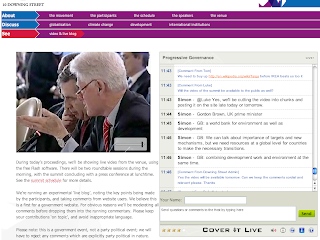The quickest way to bump a book up my reading list is to give me a copy. It worked for David Park and his latest novel The Truth Commissioner.
And so too with Tom Watson MP (recently appointed as a Cabinet Office Minister with a long-time interest in technology, and the UK Parliament’s first blogger) who was so impressed when he read Clay Shirky’s book Here Comes Everybody: The Power of Organizing Without Organizations that he sent three free copies to commenters on his blog.
It’s a thoughtful and insightful analysis of social networking and the power of transient and/or virtual communities. It arrived from Amazon, gift-wrapped in green paper about a week or so ago, and I’ve been working my way through it. At various stages in the week, it’s also been purloined and found its way to the other side of the bed. Two reads for the price of none! And the subject of a blog post later in the week.
But as well as reading a book that looks at some of the online phenomenon of the last few years, on Saturday morning I surfed across to Simon Dickson’s latest online endeavour – the experimental website associated with the Promoting Prosperity: Progressive Governance Summit.
A series of roundtable discussions held in a country house near Watford attended by twelve or so heads of state (prime ministers and presidents), representatives from the IMF, African Development Bank, WTO and a couple of UN programmes, along with Bill Clinton (The Clinton Foundation).
The agenda was based around four papers that had been written on
- Globalisation, trade and economic integration
- Climate Change
- Poverty/development
- Reform of the international institutions
Usually these events happen behind closed doors, with maybe 30 seconds of the closing press conference making the evening news bulletins. This time, as well as pre-publicising the four papers – and allowing online commenting – the video from the morning’s discussions were streamed online, along with an opportunity for online lurkers to pass comment and react to the world leaders’ thoughts.

This is where Simon’s expertise came in ... setting up and running the website, as well as live-blogging the discussions. It was an experiment, and one that I hope is repeated.
There were obviously limitations, particularly with no way for comments to be fed into the actual live discussions (though the comments will be passed to the participants afterwards). But it proved it was technically possible – hooking into much of the infrastructure (audio, video) that would already have been in place for the summit – with only two people needing to keep the online side running.
I didn’t get the time to listen to a complete roundtable discussion – though I did eat my breakfast in front of it before nipping out to Reids to get Littl’un some new shoes ... white spotty ones for Spring!
But despite the limitations, any means of opening up government and allowing voters and interested parties in the UK and beyond access to the thinking and rhetoric of the world’s movers and shakers is to be encouraged. Thank you Simon for getting stuck in, and no doubt tholing a fair amount of bureaucracy to get a Wordpress-based website up and running in the pm.gov.uk domain! Maybe they’ll hold the next Progressive Governance summit in Bangor?
1 comment:
Actually, you might be surprised how little bureaucracy was involved. There's a definite willingness at No10 to shake things up a bit, and Saturday was a deliberate part of that. But a world summit in Bangor might be shaking things just a little too much...
Thanks for the feedback (and the screengrab... didn't get round to grabbing one myself!).
Post a Comment